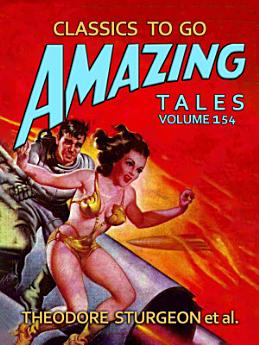Amazing Tales Volume 154
Theodore Sturgeon
Sep 2023 · CLASSICS TO GO Book 154 · Otbebookpublishing
Ebook
81
Pages
family_home
Eligible
info
reportRatings and reviews aren’t verified Learn More
About this ebook
Welcome to "Amazing Tales Volume 154", a captivating anthology that explores themes of justice, innovation, and survival in extraordinary circumstances. Each story invites you to journey through intriguing landscapes and pivotal moments where human resilience is tested. In "The Sky Was Full of Ships" by Theodore Sturgeon, we follow Gordon Kemp, a man from the city caught in the harsh desert courtroom of Switchpath, Arizona. Here, dirt-farmers and prospectors become judges and jurors, as Kemp's life hangs in the balance. With the ominous threat of the gas chamber looming, Kemp narrates a gripping tale of mystery surrounding the death of Alessandro Sykes. Transitioning to the red planet, "Memory" by Theodore Sturgeon presents Jeremy Jedd, a business visionary facing a dire crisis on Mars. As he waits at the spaceport for the overdue Pinnacle, a letter reveals a rival's impending technological advancement that could dismantle his life's work. Jedd's story is a tense race against time and innovation where the stakes are sky-high. Finally, "Righteous Plague" by Robert Abernathy thrusts us into a world where a lethal virus indiscriminately decimates populations. Amid the chaos, a group of prisoners confronts their bleak destiny under the cold gaze of masked soldiers. This haunting narrative explores themes of societal collapse and the thin veneer of civilization when faced with a relentless plague. Each of these stories in "Amazing Tales Volume 154" unravels a unique tapestry of human experience, drawing readers into worlds where the unexpected becomes reality.
About the author
Theodore Sturgeon, born Edward Hamilton Waldo on February 26, 1918, in Staten Island, New York, was a luminary in the realm of science fiction and fantasy. Renowned for his lyrical prose and profound exploration of human emotion, Sturgeon's work often transcended genre boundaries, delving into themes of love, identity, and the human condition. His career, spanning over four decades, produced more than 200 stories and several novels, with his short story "Microcosmic God" and the novel "More Than Human" standing as cornerstones of speculative fiction. Sturgeon's influence on contemporary writers is immeasurable. He was a mentor to Harlan Ellison and a significant influence on Ray Bradbury and Kurt Vonnegut, the latter of whom named a recurring character, Kilgore Trout, in Sturgeon's honor. His narrative style, characterized by its emotional depth and innovative structure, paved the way for more character-driven and psychologically complex science fiction. Controversially, Sturgeon was an early and vocal advocate for LGBTQ+ rights, often incorporating themes of gender fluidity and non-traditional relationships into his work at a time when such topics were taboo. His story "The World Well Lost" is hailed as one of the first science fiction tales to address homosexuality openly. Sturgeon's legacy is enshrined in the Sturgeon Award, given annually for the best short science fiction, ensuring his impact on the genre endures. His assertion that "90% of everything is crap"—known as Sturgeon's Law—remains a critical lens through which art and literature are often evaluated. Theodore Sturgeon's visionary storytelling continues to resonate, inspiring new generations to explore the limitless possibilities of the human spirit.
Rate this ebook
Tell us what you think.
Reading information
Smartphones and tablets
Install the Google Play Books app for Android and iPad/iPhone. It syncs automatically with your account and allows you to read online or offline wherever you are.
Laptops and computers
You can listen to audiobooks purchased on Google Play using your computer's web browser.
eReaders and other devices
To read on e-ink devices like Kobo eReaders, you'll need to download a file and transfer it to your device. Follow the detailed Help Center instructions to transfer the files to supported eReaders.







